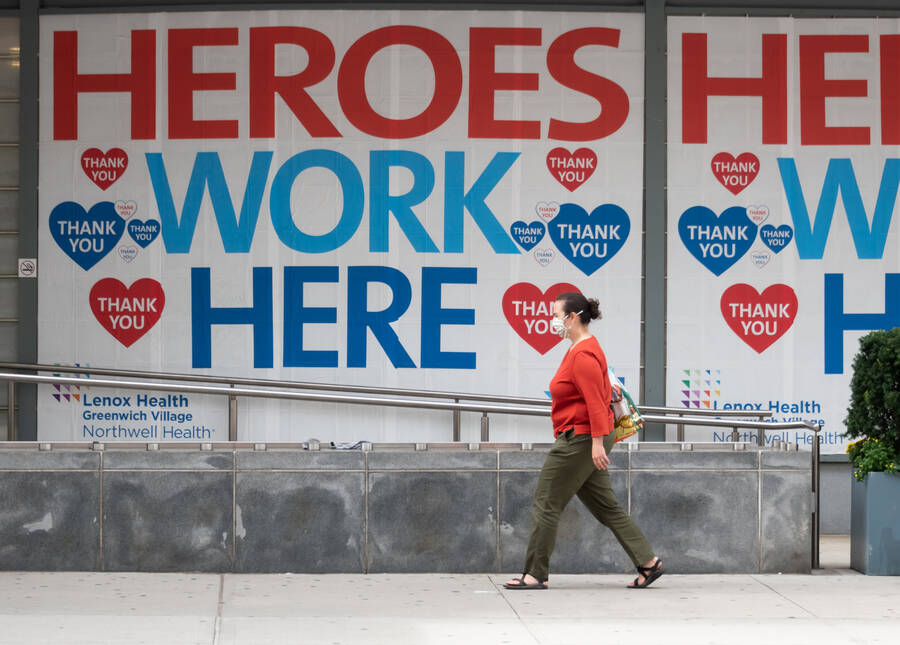
A person wears a face mask outside Lenox Health Greenwich Village hospital on September 27, 2020 in New York City. NOAM GALAI/GETTY IMAGES

Share

About 8,000 health care workers have publicly offered to renegotiate their union contracts with Twin Cities hospitals in an effort to help address staffing shortfalls that, workers warn, are only getting worse.
Members of SEIU Healthcare Minnesotaannounced the offer Nov. 30 in a virtual press conference, during which they described the impact short staffing has had on patient care in the hospitals where they work.
Emilee Greskowiak, a nursing assistant at United Hospital in St. Paul, said understaffing impacts patient comfort, safety and hygiene. She noted that it has been nearly two years since she’s had time to help her most patients shower.
ReceHospital workers, clockwise from top-left, Cliff Adams, Emilee Greskowiak, Lolita Granados and Steele Miller joined a virtual press conference on staffing shortfalls.ntly, Greskowiak added, she was the only aide serving a 25-patient ward, where registered nurses were understaffed, too.
“All I can do is empty trashes and let nurses know when people are drowning – having codes and rapids and struggling to survive through their traumas,” she said. “Nurses are barely getting their meds in by the end of shift, let alone proper care and hygiene that families desperately need to … become healthy.”
Some patients don’t get a bed at all, added Cliff Adams, a nursing station tech at M-Health Fairview Riverside Masonic Children’s Hospital. He said his unit, which treats patients with cancer and blood diseases, could not fill eight of its 24 beds recently because the “caregiver-to-patient ratio wasn’t adequate to safely provide care” to more than 16 patients.
“That meant eight beds – eight kids – did not have an opportunity to be properly cared for,” Adams said.
Understaffing is not a new problem at metro hospitals. Workers pointed to several reasons their co-workers have walked away or scaled back their hours in recent years, including the additional pressures created by the COVID-19 pandemic, once again surging in Minnesota.
But while workers see their bosses asking them to skip breaks, extend their shifts and postpone paid time off, what they don’t see from management is a plan to deal with the problem.
“It’s caused tension among staff members because we don’t have enough staff to go around,” said Lolita Granados, a clinical support specialist at Children’s in Minneapolis. “We’re missing sleep, we barely have time to eat, and we are tired.
“It is currently worse than I have ever experienced this before. We need help and support, and I would like the hospitals executives who are working from home … to step up.”
In letters to those executives, SEIU Healthcare leaders pointed to other hospitals in Minnesota that have reopened union contracts to increase wage rates and write in other incentives aimed at attracting and retaining workers, and they requested metro facilities do the same.
Twin Cities hospitals settled new, three-year contracts with SEIU members earlier this year, but wages were a sticking point in negotiations. Some 4,000 workers at United and other Allina locations were poised to strike before reaching an 11th hour agreement with the provider.
Those agreements call for wage increases ranging from 5% to 7.5% over three years. But with inflation on the rise, it’s already clear to workers like Methodist Hospital ER tech Steele Miller that hospitals need to do more.
“People are leaving these jobs for jobs that are less traumatic, less stressful, less exhausting and that pay more,” Miller said. “We are not greedy. We just need to be able to take care of ourselves while we take care of other people.”
Workers also noted that many hospitals are already paying temporary workers – so-called “travelers” – higher wages to deal with the shortage, and they called out executives like M Health Fairview CEO James Hereford, whose annual compensation has ballooned to over $3 million. Allina CEO Penny Wheeler recently topped the $2 million mark.
For Hereford, Wheeler and other hospital executives, Greskowiak offered some pointed advice.
“If you give us better pay and benefits, maybe you’ll keep and retain the staff that you have – and then also get more staff to help us get through this hard time,” she said. “Everyone’s traumatized and underpaid and missing their family and doesn’t want to do this anymore.
“It’s exhausting, and you’re burning out your staff left and right.”

